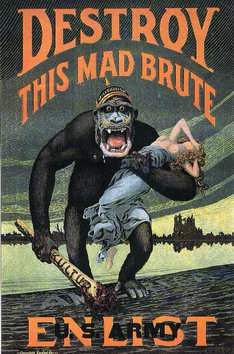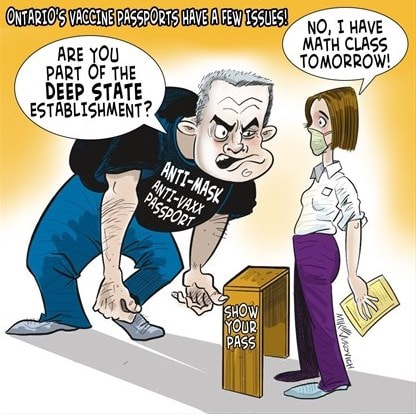|
My blog posts revolve around my interests and vocation as a historian: the intersection of history and contemporary church life, the intersection of history and contemporary politics, serendipitous discoveries in archives or on research trips, publications and research projects, upcoming conferences, and speaking engagements.
I sometimes blog for two other organizations, the Canadian Baptist Historical Society and the Centre for Post-Christendom Studies. The views expressed in these blogs represent the views of the authors, and not necessarily those of any organizations with which they are associated. |
|
My blogging experiment started around the same time as Covid, and, quite naturally, a number of my first blogs were related to coping with the pandemic. Over time, however, I noticed my blogging shifting from the subject of coping to that of politics. Increasingly my concern was with the use and abuse of the pandemic by politicians and media, and this blog continues that focus by lamenting what I see as the normalization of hate for political gain. Niall Ferguson notes that “the worst time to live under imperial rule is when that rule is crumbling.”[1] His point is simple; scapegoating inevitably rears its ugly head and the targeting of minorities ensues in times of unrest, uncertainty, and fear. Sadly, that is now the case in Canada. Canada made great strides over the past few decades trying to create a culture where hate was identified and considered morally offensive (and with new hate laws it was also a factor in prosecution of certain crimes). With great pride politicians and media pundits touted our nation’s accomplishments. And we as a nation considered ourselves to have attained something quite special. Of course, no one thought hate had entirely disappeared, but the social consensus seemed to be that it was unacceptable to promote hate towards any marginalized or vulnerable person(s). Any hint of hate – even “microaggressions” – were passionately denounced and even criminalized. A flurry of apologies were made for historical injustices related to the state demonizing of minorities. Billions was paid to groups previously the target of hate. Newspapers refused to print hateful speech in the comments section. And we established statements on rights and freedoms for just about every category of human existence. All in all, Canada seemed to be a safe place to be a minority. But I lament that much of that progress is now in tatters. My issue in this blog is not the debate over getting vaccinated or not. What I am concerned with is the discourse coming from people who are upset with those who choose not to be vaccinated. Stated bluntly, much of the discourse is shaming and hateful. It is even more egregious and dangerous because it is coming from politicians and media pundits who are supposed to know better. The hate is palpable. Mean-spirited vitriol is spewed in comment sections in newspapers. Editorials are belligerent and angry about what we are going to do about such an allegedly pathetic and dangerous segment of society. Opinion pieces decry the government’s refusal to crack down even harder on the despised 10% of the country who are supposedly dumb and selfish enough to have the audacity to differ from the majority. Consider the editorial cartoon from my local paper. It is representative of the widespread “othering” of a minority. The similarities with the World War One poster are striking. (click on image to enlarge) In the Great War the Germans were portrayed as vicious barbarians, Huns run amok, and a demonized sub-human that needed to be wiped out.
In the pandemic, the tropes are the same. The editorial cartoon (Hamilton Spectator, 7 October 2021) of a white, dimwitted, knuckle dragging, intimidating, male antivaxxer threatening a young woman is “journalism” at its worst. Such images creating an untermensch are propaganda, not journalism. And any such stereotyping of any other minority at any other time over the past few decades would have been seen as scandalous. Of course, the purpose of such dehumanizing propaganda is obvious. Hate is a great motivator of action, and when that hate serves a political purpose, then so be it. The fact that our Prime Minister and many other politicians have stoked the hate to get re-elected is not surprising. I have read enough history to know that unscrupulous politicians will scapegoat and demonize to serve their agenda. In fact, hate “works” and will often get one re-elected. The fact that newspapers will print such shrill and hateful vitriol about fellow citizens is also not surprising, since they need to sell papers to the outraged majority. What happened to trying to understand and respect a minority’s position? What happened to an aversion to speaking violently and harshly about a minority. What I am disappointed with is the normalizing of something that we seemed at one time to have made unacceptable. I am talking about a change in zeitgeist, and increasingly the “spirit of the age” is that hate for those who refuse to get vaccinated is now fair game if it serves the “greater good.” I lament the opening of the pandoras box of hate. One wonders how we will ever get all that hate back in the box. And one wonders how any minority will ever trust the majority again, for when things get tough we seem to be willing to get tough on a minority. So what does the church do in a time of rising hate? For a start it can heed the words of a clergyman during the tumult of the conscription crisis in WW1: “Our hope lies in the moderate and reasonable men of all parties and all faiths, who will seek to understand the point of view of those who differ with them, and who in relation to those of another race and faith will observe the rules of fair play and justice. Especially we must look to those who are actuated by the spirit of Christ, in which even justice is transcended, though never displaced, by the spirit of good-will and brotherhood. The Gospel of Christ will be found the solvent for this and all other national problems, even as it is the hope of salvation for the individual.”[2] [1] Niall Ferguson, the War of the World: History’s Age of Hatred (London: Penguin, 2006), 176. [2] “Our National Problem,” Maritime Baptist, 21 March 1917, 4. In a similar vein, bishop John Montreal stated: “I want to appeal to you all, not to say or do anything that will embitter the racial or religious feelings of any during the fight. Facts must be stated, but they can be stated in a gentle and manly spirit, not in clamouring denunciation.…fight as the servants of the Lord Jesus.” See John Montreal, “The Bishop’s Message,” Montreal Churchman, September 1917, 1.
0 Comments
Leave a Reply. |
Archives
May 2024
|



 RSS Feed
RSS Feed
